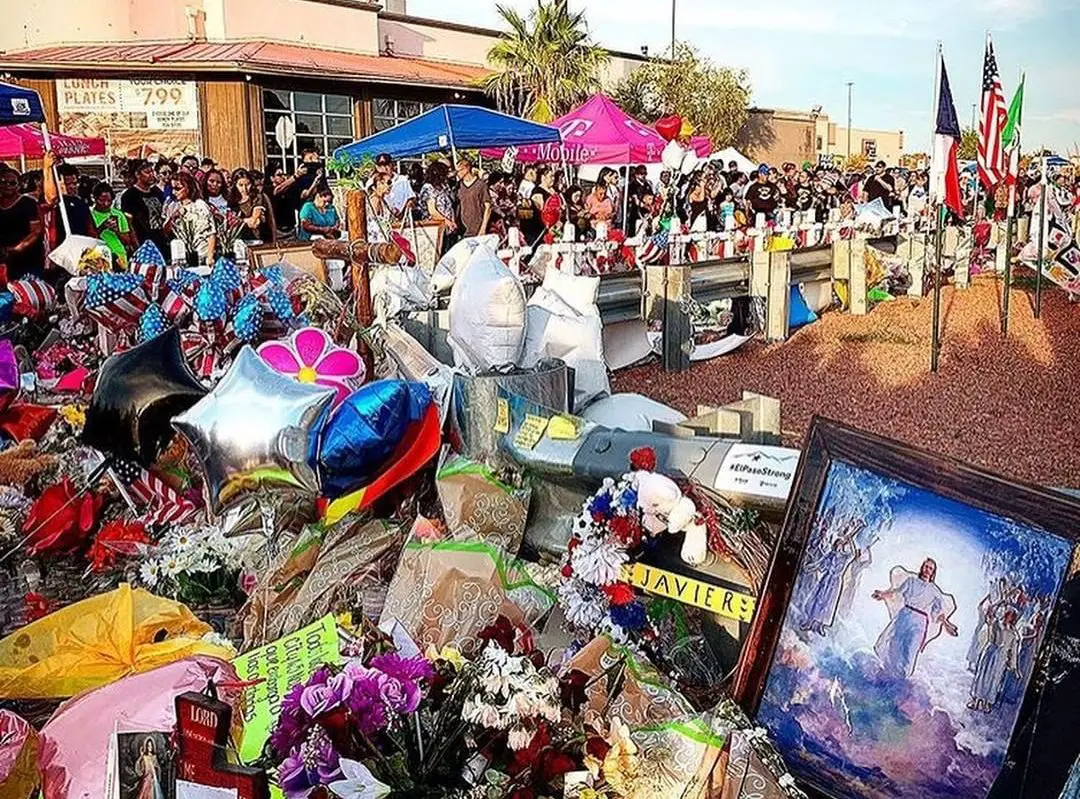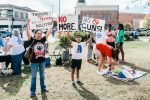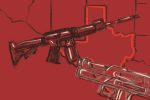It begins with those abrasive, firework-mimicking sounds — the kind that extends its fingers toward the sea of fear-stricken faces, grasping their cheeks to stare, compelling their eyes to see nothing but horror. In that moment, within the Walmart in El Paso, Texas meant to be a cornucopia of back-to-school supplies, peanut butter sandwiches and Captain Crunch cereal, strangers are bound together by a terror no one expects to have to ever live through. On that Tuesday morning, they are now victims of yet another mass shooting.
Twenty-two dead — and counting. More than two dozen holding on to the last withering thread of their life. And they are not the last.
Thirteen hours after the El Paso Walmart shooting followed the 255th American mass shooting of the year and third in that same week.
Dayton, Ohio: 27 injured. Nine dead.
All to be erased from the nation’s memory until the next televised mass shooting unfolds, where another nine, 22 or even 75 take their final breaths because of those motivated by rigid partisan creeds.
The outcry for justice, though, is evolving into mangled and red-faced bawling. Americans refuse to continue relinquishing their lives to the fear of being murdered at their local grocery store or elementary school.
Since the 2012 Sandy Hook Elementary tragedy, there have been a total of 2,180 mass shootings in the United States. Not only have mass shootings increased in number, but they have also diversified in location. From night clubs to places of worship, many Americans are expressing their dread of simply walking out the door and yearn to live a life undefined by gun violence.
A health science college student from Frisco, Texas (who prefers to remain anonymous) states that she will be more conscious of who she sits with in class moving forward.
“We shouldn’t be living in fear that we could get shot and killed anywhere or anytime,” she says. “We need better regulation on who can and cannot own a gun or eliminate [guns] altogether.”
The health science student shared a high school class with the El Paso shooter and never expected to be in a situation where she was near someone who could enact such violence and hatred on a largely Hispanic community.
“We should limit the access to guns and be more aware of our surroundings and people we interact with,” she concludes.
As a college student, she knows she should not have to be hyper aware of her surroundings within the classroom — or anywhere for that matter. She goes to school to take notes during her lectures, to study for her exams and to attain her bachelor’s degree — not to allocate her time meant for education toward nervously gazing over her shoulder to analyze the potential threat posed by various classmates.
Her hometown, Frisco, is a relatively crime-free area. Nevertheless, because of the El Paso shooting and its close ties with the North Texas city, residents of Frisco and neighboring towns have implemented precautions to mitigate their fears.
Immediately following the El Paso shooting, Walmarts throughout Frisco increased police watch at their entrances as a safeguard for shoppers. Additionally, beginning this school year, Frisco will be increasing the service of first responders throughout the first few weeks of school.
Collin Community College, an institute the El Paso shooter attended, will be offering additional counseling services for students. Their website details, “In light of recent events, Counseling Services would like to emphasize that counselors are available to meet with students.”
And the most aggressive stance of all, the Plano police department (Plano bordering Frisco) created a free program for active shooter training.
The Plano Police program announcement, which was released a short six days after the El Paso shooting, states that the training is “designed to empower the public to respond to and to survive active shooter incidents … and how to utilize ‘Run, Hide, Fight’ strategies.”
It also indicates that participants will learn how to control life-threatening bleeding, so that death tolls can be minimized in the instance of a mass shooting.
The foundation of a program intended to arm citizens with survival skills for mass shootings is a helpful resource, given the current state of the nation. But to put this initiative into perspective, there should not be a reason to teach everyday Americans how to control life-threatening gun wounds.
The United States should not be acquainted with bloodshed, but it already is. So much so that the frequency of mass shootings is beginning to desensitize Americans to gun violence.
These violent acts have felt distant, but their occurrence in popular places like grocery stores, tragically reveals that anyone can fall victim to a mass shooting. However, Americans are doing everything in their power to counteract the violent transformation their country has undergone.
For the past few weeks, Washington lawmakers have been in August recess. In an effort to enact stricter gun laws after the mass shootings, many Democratic lawmakers are demanding that U. S. Senate Majority Leader, Mitch McConnell, call Congress back into session.
Representatives in Congress understand their responsibility to serve the American people, and after recent polling from Quinnipiac University, 61% of Americans are in favor of stricter gun laws. A handful of regulations aiming to reduce the occurrence of gun violence includes more thorough background checks, red flag laws, gun licensing and assault weapons bans.
Currently, the fate of gun laws falls largely onto McConnell, who has a rigid background check bill lying on his desk but is taking no action to propel it into law.
McConnell’s lack of response to the mass shootings is prompting nationwide protests from survivors, mothers whose children were victims of gun violence and anyone living with the fear of making the next headlines as another mass shooting victim.
Rampant murder does not have to continue being an American reality. Prayers are wonderful and appreciated, but they will never be as powerful as actions. Death by guns can be eliminated through empathetic lawmakers understanding the pain of those who have lost loved ones because of Congressional inaction.
Citizens of Frisco have since adjusted their lifestyle to better cope with the repercussions of the mass shootings. As a city that touts its high levels of safety, Frisco’s newly emerging transformations are incomprehensible. Luckily, the uproar by Americans for a change in current firearm legislation is pressuring government officials to advocate policy that promotes their safety.
Thirty-one deaths in one week, and 1,196 deaths to mass shootings since 1966. A country meant to be united has never been more divided. Now, it is the entire country’s responsibility when it decides to end mass shootings and gun violence. The number of lives lost has come to number too many. Do not let these deaths be in vain.
















